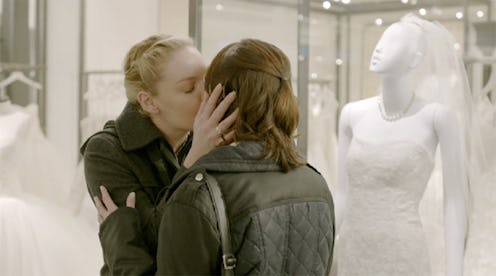
This summer has seen the release of some huge movies, from franchise giants like Jurassic World to animated hits like Inside Out to raucous comedies like Trainwreck. But there's a new movie which is notable not for its earning potential, but for its cultural significance on a specific topic: Jenny's Wedding , a feminist and important film out Jul. 31. The movie tells the story of a woman (Katherine Heigl) who shocks her conservative family when she reveals to them that she will be marrying another woman (Alexis Bledel), and from its topic to its timeliness, Jenny is a major win for women and feminism.
The first and foremost item that makes Jenny's Wedding significant is that it comes at a crucial time for LGBT rights. As you likely know, on Jun. 26, the Supreme Court issued a 5-4 decision that declared gay marriage legal in the United States. For the first time in history, citizens in all 50 states now have the right to marry whomever they love, regardless of gender. There are still many strides to be made, and the battle against ignorance and intolerance continues, but the ruling was a major step forward for LGBT rights in the United States. The release of Jenny's Wedding is therefore incredibly relevant in its proximity to this landmark event and the broader fight for LGBT equality.
Another notable aspect of the film is its placement of Katherine Heigl in the lead role. The actress is known for playing the cliched "successful but romantically unsatisfied heterosexual woman" in countless rom-coms, and so it's refreshing to see her take on a lead role with more weight. Jenny's Wedding is undeniably a departure from the actress' norm of crying over lost loves (remember Denny on Grey's Anatomy?) and swooning over dresses (in the aptly named 27 Dresses, among other films). It's good to see her branching out, and clearly, the change is working; in its review of Jenny's Wedding, Variety declared that Heigl "brings both ferocity and vulnerability to the role of a favored child discovering the courage to be herself in front of her parents and siblings."
And then, of course, there's the simple fact that the movie stars two women, and tells their stories. Films featuring female leads are startlingly rare, let alone ones that feature non-heterosexual female leads. Jenny's Wedding, however, puts two complicated, three-dimensional women in its main roles, and let's their lives — not those of their male co-stars — lead the movie and drive its narrative.
So will Jenny's Wedding prove to be a groundbreaker for feminism? The answer may depend on the viewer, as multiple critics have noted that the film is sappy and overly formulaic at parts, taking away from the strength of its message. But reviews aside, the significance of Jenny's Wedding is really its symbolism as another step forward in this crucial time for LGBT and women's rights; it matters less how the exact story is told, but that it's being told in the first place.
Images: IFC Films (2); Getty Images